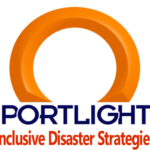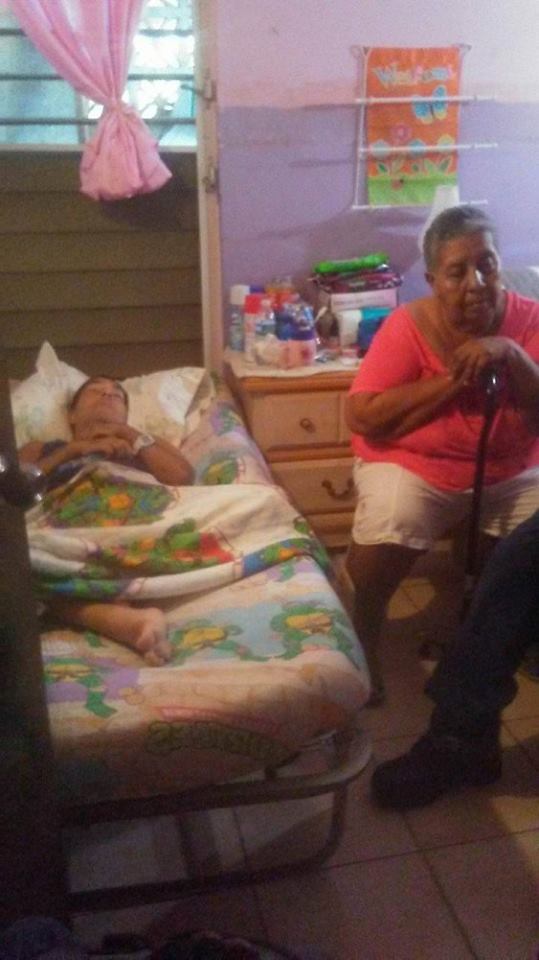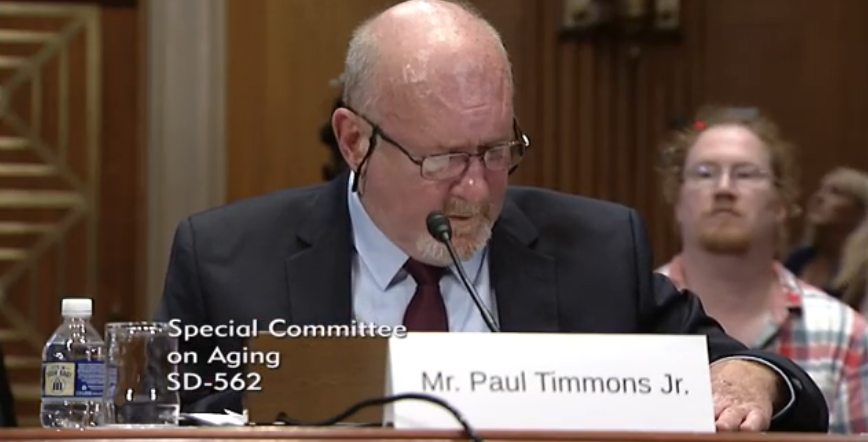
Paul Timmons and Marcie Roth of Portlight Inclusive Disaster Strategies bring us up to speed on how people with disabilities are being left out of supports during emergencies.
2017 will certainly be distinguished by our response to national disasters and emergencies. From floods, to an unrelenting hurricane season, as well as yet another round of wildfires in California our nightly news and social media have been flooded with images of Americans in peril as well as requests to offer support and solace to American citizens. In a case that has become far too familiar, the lack of preparation for the needs of individuals with disabilities has all been played out for all to see on our TV and tablet screens. As we consider what can be done to support survivors of these national emergencies, we touched base with two of our experts in the field – Paul Timmons and Marcie Roth of Portlight Inclusive Disaster Strategies and the Partnership for Inclusive Disaster Strategies to talk about inclusive emergency preparedness and what we can do to be better prepared and to help our friends and families during a disaster..
So first off. Why is Disability or Inclusive Emergency preparedness so important?
Paul: I think there is a misconception that during an emergency people with disabilities are always “well cared for” or even that any level of engagement is “good enough” because an emergency is taking place. Sadly, this is not the case and people with disabilities are often left out of the planning process or have difficulty accessing the same services and response that is prepared for the fellow members of their communities. Despite years of planning, people with disabilities and older adults often pay the price for our collective emergency planning shortfalls. Many thousands end up without the basic necessities to meet their independence, safety, and health maintenance needs. Most have been denied their basic right to equal access to federally funded emergency programs and services. This treatment is not only unfair, but blatant disregard for the unwaiverable civil rights of individuals with disabilities. There are no civil rights loopholes releasing anyone from their legal obligations in emergencies and disasters, and yet individuals with disabilities are often treated as if they should be grateful for second class supports and planning as an afterthought which puts their lives in even greater danger during an emergency.
Marcie: This also has an impact on business and industry. Making sure that you are using practices that address the needs of all people impacted by an emergency – especially those with disabilities is not only the right thing to do – it ultimately provides better health outcomes for them as well. When people don’t have the access to basic stuff to prepare them for response to and recovery from the next big thing, they are going to be disproportionately impacted which is going to result in health deterioration and inappropriate institutionalization.
Not only is it illegal, but it is would also be a smart business practice to help someone who uses dialysis to have access to the right nutrition and adequate clean water. It is foolish to expect that someone who is in an non-air-conditioned environment in very hot and humid weather is not going to end up with a significant health issue – or to think that someone who goes to an inadequately staffed shelter and then has to sleep in a wheelchair for two weeks, is not going to be adversely affected or injured by this, and yet these are the specific sort of hurdles being faced by people with disabilities in disaster zones.
But isn’t personal emergency preparedness the responsibility of the individual with a disability?
Paul: A few years ago there was a story about the California Wildfires about one woman who died during that particular disaster. She was a wheelchair user and there was a lot of press surrounding her death. She had a written personal emergency preparedness plan. It was written, and I happened to read it and it was great. It was as good a plan as one could come up with but the systems she was relying on just sort of shrunk away and fell apart. She and her attendant and her family for a variety of reasons just were not able to execute it. And at the end of the day she died not because she didn’t have a plan, but because some of the emergency professionals she was depending on also did not have a plan to support her.
I tread very very lightly around this ghastly obsession with the personal responsibility piece because it leads to scapegoatism. Of course you need to have some idea about what you and your family are going to do during an emergency, but like Mike Tyson says, “everyone has a plan until they get punched in the mouth.” And so at the end of the day, there are a couple of pieces to this – Not everybody can afford to evacuate and stay with family. And often times though an individual may have a plan there may not be the means available to implement that personal plan.
Marcie: Or you may get airlifted or moved away from the tools and resources that were key to your personal plan so even if you have been able to gather accommodations, or medication – all of which also can only be done if you have access or are able to pay great personal cost, you could still find yourself in need of the very same supports that are openly offered to other people who may not have disabilities. I cannot tell you how many meetings I have been in where someone says, “Well don’t individuals with disabilities have a personal responsibility to be prepared?” Yes we want people to take personal responsibility, and we teach people to do that to the best of their ability, but there is this weird disconnect that if a person with a disability finds themselves in the same position of being unprepared in an emergency then they have different preparedness expectations than someone who does not have a disability and that is not fair.
We learned lessons from Katrina and Sandy but did not implement many of those lessons. Hopefully we will be able to implement more lessons from the most recent storms. [These lessons have the chance to] improve responses to reduce injuries and save lives. – Paul Timmons, in his testimony to United States Senate Special Committee on Aging.
In the wake of Hurricanes Irma, Harvey, Jose, and Maria, what does that mean for individuals with disabilities that are impacted or present in the areas with large scale emergencies?

Portlight’s first visit on October 4, 2017 was to see how we could help Elvis who – as reported by family – has multiple disabilities including a degenerative sisorder, schizophrenia, type 1 diabetes, and is blind and Deaf. He is in need of depends (small/med), blue/bed pads, wipes, gloves, water, and a wheelchair to transfer from the bed to the shower. On the spot we were able to give Elvis a wheelchair so transferring is easier, as well as some supplies.
Marcie: When we fail to plan inclusively of the whole community. When we fail to provide equal access in the planning process we should not be shocked that there are a whole series of cascading barriers that occur – some of which have to do specifically with cognitive issues, the bigotry of low expectation issues, or even simply communication. If you never thought about how to communicate with the people of rural Puerto Rico that their dam is about to break and you’ve got 70,000 people in harm’s way and you are using bullhorns to tell people that they are in harm’s way- that is not going to work very well for deaf people or people who are hard of hearing or folks for a variety of reasons that are not going to hear the message or that the message is not going to be received for other reasons. Time and again it will be our folks – individuals with disabilities that are disproportionately impacted.
Paul: My concern has always been the issue of human migration – where are individuals going to go during an emergency? Where are we going to go, are they taking us with them, and what is to be done with individuals with disabilities when they arrive at whatever new location? We are not ready for this, and so planning around the movement of people and the barriers to move people becomes a disaster equal to or greater than that actual disaster.
In Houston there was a lot of press given to the support from the Cajun Navy. Their support was valuable and their assistance was priceless to the relief effort, however, depending on the support of amateurs with untested and recreation grade equipment is not a strategy for good preparedness and response.
Do you think that there has been too much emphasis placed on the engagement of good Samaritans for disability emergency preparedness rather than engagement with trained professionals?
Marcie: There is this bizarre notion that getting food and water to people is the responsibility of volunteers. We have all worked really hard for a long time to say that doing disability related work should be paid and paid well. People with disabilities should not have to base their safety on volunteer benevolence. – especially at a time where a person’s health, safety and independence is likely to be jeopardized. That is the worst time to be put in the hands of volunteers and do gooders – who time and again make [incorrect] assumptions about the best means of support and relief for our people.
Incidentally, the sleeping in wheelchairs issue [that I mentioned earlier] was an occurrence that we had not heard about since working on the Katrina response, and it has unfortunately become an issue again during the recent hurricane response. This tells us that this [supporting individuals with disabilities during emergencies] is not something that we should be leaving to volunteers. It is something that we should require professionals to be exercising for, with guidance and technical assistance from experts- disability advocates.
How should we be creating inclusive emergency preparedness practices and how do we engage stakeholders and services personnel at every level?
Marcie: Most important is the disability community’s adage of Nothing about Us without Us. We should be encouraging local disability experts such as local Independent Living Centers, resource professionals and advocates to be at the planning, implementation or long term recovery tables. That way, when we do have an emergency we are sending a message to local first responders and disability experts that they are already key partners in anticipating problems and finding solutions and that their expertise is valued.
Doing this would represent a paradigm shift of how we choose to value our resources in the planning processes of engaging local experts (on disability, housing etc.) and attributing value to their expertise. Often during a disaster, outside experts will be called in to address particular issues (i.e. disability, transport, housing) but don’t know the local area. Often these experts will be paid for their expertise while local experts will be expected to offer their expertise for free. This causes our local experts to feel unsupported and less likely to come forward.
Paul: We also have to work to support other partners who understand disability and seek to understand the independent living philosophy and disability rights. These are considerations that cannot be taught in the midst of a disaster and yet are necessary for effective engagement and support of individuals with disabilities.
How do those partnerships look? Are we talking just emergency services people or other sorts of stakeholders?
Paul: In the recent emergency in Texas caused by Hurricane Irma and the resulting floods, we worked closely with Anthem to help provide supports for individuals with disabilities. The partnership with Anthem worked because at no time did Anthem professionals question whether or not a need was associated with a positive health outcome for a member. (It was assumed that if it was in support of their health, it was needed.)
Marcie: There’s an element of successful emergency preparedness in which is the need to put aside fears, or a desire to stick solely to a wrote system rather than seeking the way to find supports and solutions for what people need in real time. Anthem’s job is not to make sure people have safe drinking water, however in order to maintain health and safety, Anthem helped to find people what they need to be healthy. Some of the work we were doing collaboratively in Texas were things like making sure people on dialysis could get to their appointments. What we started to discover was they their standing transport to dialysis and the center might be intact, but Paratransit was not going to let them stop at the store to get water (even though it meant keeping their dialysis processes successful.) So we had to keep hammering away at what to do to address that particular need.
So a key to the success was not just to collaborate but the agreement that we were going to do whatever was necessary to connect people with the services and resources that were needed?
Paul: Yes and this is a mainstay of successful and inclusive emergency preparedness.
Marcie: And that is where the preparedness effort is so important. We have to ask ourselves if we are going to keep admiring those problems or are we going to do something before we have to scramble the next time. The preparedness effort will be important including helping individuals develop real planning around emergencies. I have this fantasy that we will also have individuals with disabilities participate in exercises with emergency services personnel to really test out if these inclusive practices work. If we do it in a no fault environment we can learn some important lesson. SO it is the individual planning piece on the part of the members, it is the planning piece on the part of the health care services teams, and on the part of responders.
So we have gotten past the initial hurdle of there being absolutely no thought given on the needs and accommodations of individuals with disabilities and yet there is still a significant amount of ground to cover before emergency preparedness and response is truly inclusive?
Marcie: Indeed. We are also still struggling with the very same issues that keeps anyone working in social justice up at night: poverty, discrimination, the bigotry of low expectations – all of which make people with disabilities low on the priority list.
Paul: There is also a need to remove what I call the “mythical disaster loophole” – the idea that a bad emergency or disaster pre-empts the independence or personal agency of an individual with a disability. Right now, most planning occurs “FOR” people with disabilities and older adults, not “WITH” us. Moving forward we need to ensure there is substantial leadership and participation during emergency planning.

You may see Paul Timmons’s testimony to congress at https://www.aging.senate.gov/hearings/disaster-preparedness-and-response-the-special-needs-of-older-americans or read a transcript at https://www.aging.senate.gov/imo/media/doc/SCA_Timmons_09_20_17.pdf
What can we do now that we are in a recovery phase to build up include disability emergency preparedness?
Paul: Effective practices for whole community inclusion must be led by experts in disability and aging inclusive emergency management. The people most knowledgeable about the needs in their own community are best suited to lead disaster response and recovery. We must find a way for these organizations to have adequate resources to do the complex and long-term work that is needed for people with disabilities and older adults to participate with government and the disaster business giants to get grants, donations, and tax payer dollars to optimize whole community inclusive disaster recovery.
Marcie: In our testimony to the United States Senate Special Committee on Aging, some of the recommendations that we made drill into the fundamental opportunity that exists to get disability planning and resources discussed and planned for before an emergency takes place, rather than leaving it to chance or waiting until the last minute. Paul and I believe very strongly that if simple actions were taken such as including temporary housing and sheltering in the community housing agenda, or evacuation into the community accessible transportation agenda, then the needs of disaster survivors with disabilities — access to health care, access to education, assistive tech – whatever it is to have the emergency preparedness pieces baked into whatever everyone else is doing we would be more successful in supporting individuals with disabilities during an emergency. But if no one makes these plans, and if instead money is being invested in inaccessible housing inaccessible transportation inaccessible health care, etc. etc. folks will get charged exorbitant prices for ramps and access, and they will be disproportionately impacted by slow progress. Universal design and a whole community commitment to accessibility contributes to far greater community resilience.
Plus the idea that there isn’t money for this is ridiculous. Every Federal dollar must comply [with obligations under the Rehabilitation Act of 1973]. If our community does not lean all the way in on this, and use this as an opportunity to go after new money (supports) to accomplish this stuff that’s important to us we will always do what we have always done, what we are always going to get what we have always gotten.
To learn more about how you can support Disability Inclusive Emergency Preparedness, visit Portlight Inclusive Disaster Strategies at http://www.portlight.org/. You may see Paul Timmons’s testimony to congress at https://www.aging.senate.gov/hearings/disaster-preparedness-and-response-the-special-needs-of-older-americans or read a transcript at https://www.aging.senate.gov/imo/media/doc/SCA_Timmons_09_20_17.pdf


